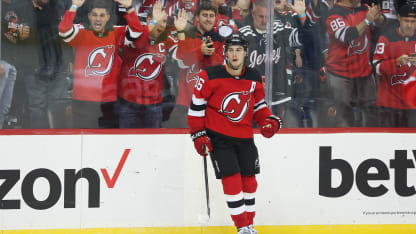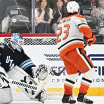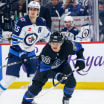Here is the Nov. 1 edition of the weekly NHL.com mailbag, where we answer your questions asked on X. Send your questions to @drosennhl and @NHLdotcom and tag it with #OvertheBoards.
What do you make of Jack Hughes' hot start and how sustainable is the Devils' power play? -- @Teeeeejj
Hughes' hot start is sustainable. The New Jersey Devils' red-hot power play is not.
Hughes is one of the best players in the world right now and will be for a long time. He's the new version of Patrick Kane, only at the center position instead of right wing. He's slippery good, hard to cover with elite hands, hockey sense and coordination. He moves around the ice like he's floating and when he gets the puck, he's become strong enough to hold onto it. It used to be easy to bang into Hughes and get the puck off him. Now he doesn't get hit because he's too quick and elusive. He has 18 points (five goals, 13 assists) in eight games. OK, so that's a 184-point pace. He's not getting 184 points, but he got 99 last season and I'll be stunned if he doesn't approach 115 or 120 this season. So, sure, he'll slow down, but that doesn't mean his hot start isn't sustainable to the point where he is going to be in the running for the Art Ross Trophy as the leading scorer in the NHL, and by extension the Hart Trophy given to the most valuable player, all season.
But Hughes' production is tied directly to the Devils' torrid power play. He has 10 points (three goals, seven assists) on New Jersey's man-advantage, which is 42.4 percent through eight games. That's 10 percent better than the Edmonton Oilers were last season, and they set the NHL record for the best single-season power-play percentage (32.4 percent). The power play will slow down and with it will Hughes' production on it. That's a big reason why he won't continue to average 2.25 points per game.
However, the Devils will continue to have an elite power play all season because of the personnel they can put on it and the chemistry they clearly have together. They have scored at least two power-play goals in six of eight games. Let's say it drops 15 percent. That's still a power play between 27 and 28 percent. Only 21 times in NHL history has a team had one at 27.0 percent or better in a full season. It's reasonable to think the Devils could be the 22nd team to do it.
What do you make of the Buffalo Sabres? Aside from the opening 5-1 loss to the New York Rangers they've been in a lot of close games, winning some, losing some. Are they on the up after their recent 4-0 win against Colorado? -- @brett_donaghue
That 4-0 win against the Colorado Avalanche on Sunday was as good as it gets against a top team in the NHL. The Sabres limited Colorado to 23 shots on goal, 16 at even strength. They protected goalie Ukko-Pekka Luukkonen by blocking 21 shots. They had four different goal-scorers and their defensemen contributed on the score sheet. The only problem was they put the Avalanche on the power play five times before Jeff Skinner's penalty with six seconds left in the third period gave Colorado a sixth chance on the man-advantage. But the Sabres killed all of them off, and four of the five (before Skinner's) came after they built a 3-0 lead.
The Sabres have scored at least four goals in four straight games, and easily their best game of the season was against the Avalanche. It was a tougher than expected start, when they went 2-4-0 with 13 goals in their first six games, but they've gotten the offense going in the past four. If they can check, defend and outplay a top team like the Avalanche, then good things are going to keep coming. I picked them to make the playoffs for a reason. They will.


















